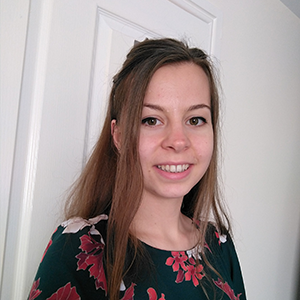Hannah MacFarlane: Psychology – EDF Energy

What degree course did you study and when did you graduate
Psychology BSc - graduated summer 2019.
Why did you choose that particular degree course?
I chose Psychology just because I enjoyed it and found it interesting. I had no specific career in mind, but I knew I had a particular interest in clinical/abnormal psychology so I had a vague plan that I might become a counsellor or therapist one day.
Tell us about your employer
I work for EDF Energy. They are known for being an electricity supplier but the part of the business I work for has nothing to do with the customer side and is more related to the generation of electricity in the nuclear power plants.
What was the position you were recruited for. Please briefly outline the position you were recruited to within your organisation and summarise the business needs and role you fulfil
I was recruited into the Human Factors team. Human Factors, also known as Ergonomics, is highly related to Organisational Psychology and our job is to look at processes and equipment that people work with and think about how they can be designed to best support and improve human performance and reduce the probability of error.
This includes loads of different skills, like integrating with various other technical disciplines, understanding and modelling error, calculating error probabilities, designing user interfaces, and conducting research. Human Factors specialists are also employed in lots of other industries such as healthcare, construction, renewable energy, vehicle design, and office design.
What attracted you to this position?
When I finished my Psychology degree, I was eager to get out into the world so I wanted a job I could get stuck into right away, rather than having to go and get more qualifications. I also wanted to be able to use my Psychology knowledge in my job, and I was struggling to find something that ticked both of these boxes.
To get into Human Factors I only needed to do a one year Masters and then I could go straight into a job (although the Masters isn't a requirement) and Human Factors explores cognitive mechanisms behind human behaviour and errors so it was exactly what I was looking for.
What are the key skills you learnt at Warwick that have helped you with your career to date?
I use lots of knowledge and skills in my job day-to-day that I learned studying Psychology at Warwick such as cognitive models of working memory and attention, theories around what causes people to make errors, and an understanding of individual differences.
What has been your greatest career challenge to date and how did your experience and skills help overcome it?
I joined the workforce in September 2020 which was a huge challenge. Everyone was working from home and it was 8 months before I met one of my colleagues face-to-face, which made it really challenging to build friendships at work, and know who to go to for advice on technical issues.
Over time I built confidence and got better and got more comfortable with ringing people up to ask questions rather than being able to just go over to their desk and ask them and the more junior members of my team set up weekly video calls just to chat which made it easier to form friendships. Nothing is equal to spending time with your colleagues face-to-face though, so I have made the most of being able to go into the office since covid restrictions lifted.
What top tips would you give to students looking for a career in your market sector?
If you're interested in working in Human Factors, try and reach out to someone who is already doing it if you can. There's a huge shortage of Human Factors specialists so anyone you contact should be invested in getting more people into the career.
A Masters in Human Factors really helps with finding a job but it's not essential, and if you've got some contacts in the field, or even if you've managed to get involved in a project, this could go a long way.
What do you know now that you wish you had known when you were applying for jobs?
Don't panic if your friends had job offers by Christmas and you don't feel like you're getting anywhere! Companies advertise graduate jobs all year round, and I found that many actually waited until exams were out of the way before advertising so you've not missed the boat.
It's still good to apply for jobs when you see ones you like - even if they don't end up being right for you, it's still good practice. But by exam season, focus on your exams, not on job applications! You'll get overwhelmed if you worry about both.
Any additional advice or comments?
Know your worth! You got into Warwick uni which means you've got something valuable to offer to your potential employers. Don't be disheartened by rejections - some people find the job for them right away and for some people it takes years but it's got nothing to do with their skills, experience, or personality so don't take it personally.
You will find the job that's right for you (although it might not be the first job you accept).
